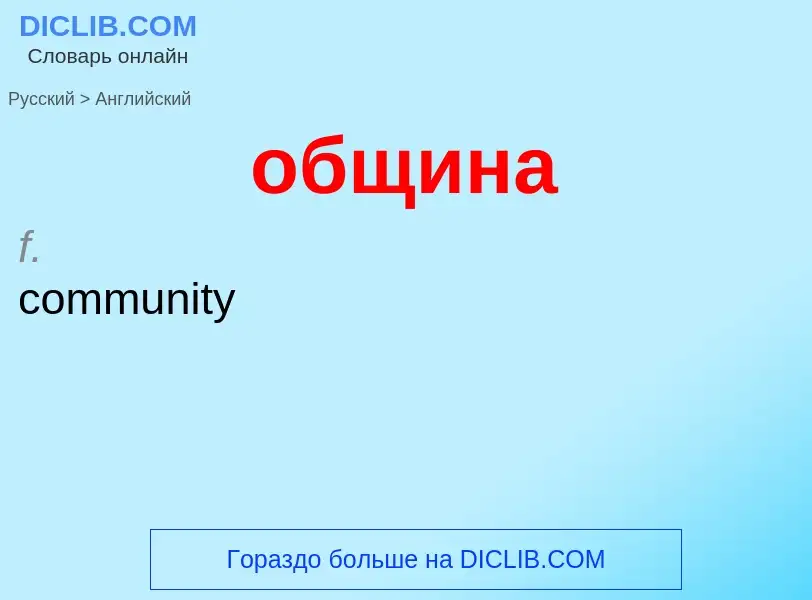Translation and analysis of words by artificial intelligence
On this page you can get a detailed analysis of a word or phrase, produced by the best artificial intelligence technology to date:
- how the word is used
- frequency of use
- it is used more often in oral or written speech
- word translation options
- usage examples (several phrases with translation)
- etymology
община - translation to English
community
[səu'dæliti]
существительное
общая лексика
братство
община
товарищество
братство, община
Definition
Wikipedia
Obshchina (Russian: община, IPA: [ɐpˈɕːinə], literally "commune") or mir (Russian: мир, literally "society", among other meanings), or selskoye obshchestvo (Russian: сельское общество, literally "rural community", official term in the 19th and 20th century; sil's'ke tovarystvo, Ukrainian: сільське товариство, literally "rural community"), were peasant village communities as opposed to individual farmsteads, or khutors, in Imperial Russia. The term derives from the word obshchiy (Russian: общий, literally "common").
The mir was a community consisting of former serfs, or state peasants and their descendants, settled as a rule in a single village, although sometimes a village included more than one mir and, conversely, several villages were sometimes combined in a single mir. The title of the land was vested in the mir and not in the individual peasant. Members of the mir had the right to the allotment, on some uniform basis, of a holding that each member cultivated separately. A holding could not be sold or bequeathed without the consent of the mir. As a consequence of its collective tenure, the mir had the power to repartition the land from time to time among its constituent households. The mir dealt primarily with the household and not with the individual. The peasant had a right to a holding but not to a particular holding, and he could not dispose of it freely.
The vast majority of Russian peasants held their land in communal ownership within a mir community which acted as a village government and a cooperative. Arable land was divided in sections based on soil quality and distance from the village. Each household had the right to claim one or more strips from each section depending on the number of adults in the household. The purpose of this allocation was not so much social (to each according to his needs) as it was practical (that each person pay his taxes). Strips were periodically re-allocated on the basis of a census to ensure equitable share of the land. This was enforced by the state which had an interest in the ability of households to pay their taxes.

![''Obshchina Gathering'' by [[Sergei Korovin]] ''Obshchina Gathering'' by [[Sergei Korovin]]](https://commons.wikimedia.org/wiki/Special:FilePath/KorovinS NaMiru.jpg?width=200)
